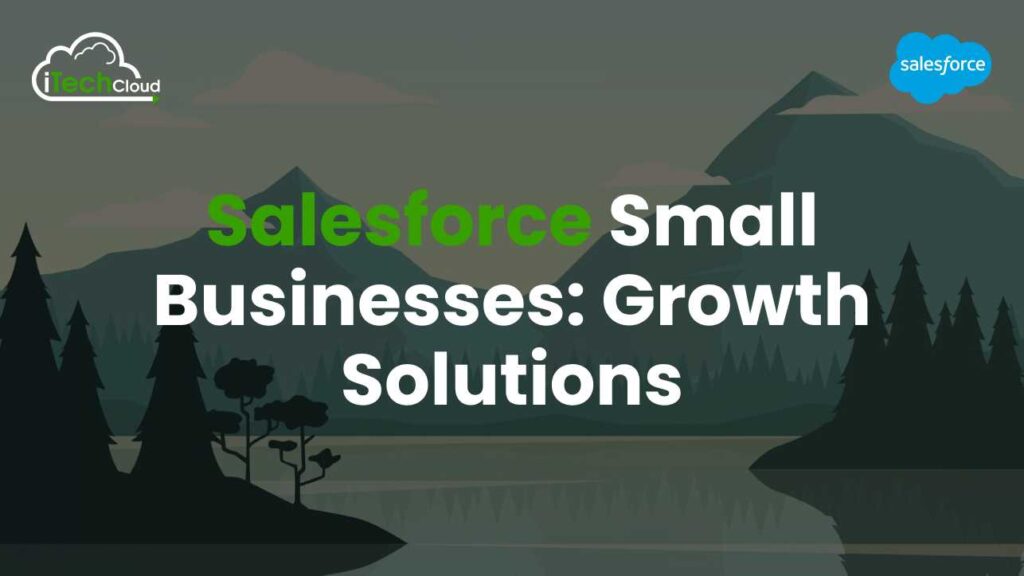Salesforce Small Businesses: Growth Solutions

Introduction of Salesforce Small Businesses
Salesforce Small Businesses are the backbone of the economy, but they often face challenges in scaling their operations and achieving sustainable growth. Salesforce, a leading CRM platform, offers tailored solutions to empower small businesses in streamlining processes, engaging customers, and driving revenue growth. In this step-by-step guide, we’ll explore how small businesses can leverage Salesforce to unlock their growth potential.
Table of Contents
1. Assessing Business Needs
Before diving into Salesforce implementation, Salesforce Small Businesses should assess their unique needs and challenges. This involves identifying pain points in sales, customer service, marketing, and operations. By understanding specific requirements, businesses can tailor Salesforce solutions to address key areas for improvement.
2. Choosing the Right Salesforce Edition
Salesforce offers various editions, each catering to different business sizes and requirements. For Salesforce Small Businesses, Salesforce Essentials is a comprehensive solution that provides essential CRM functionalities at an affordable price point. It includes features for sales, customer service, and marketing, making it ideal for small teams with limited resources.
3. Customizing Salesforce for Your Business
Once the appropriate Salesforce edition is selected, businesses can customize the platform to align with their workflows and processes. This involves configuring fields, layouts, and automation rules to reflect the unique needs of the organization. Salesforce’s intuitive interface and drag-and-drop customization tools make this process accessible even for non-technical users.
4. Streamlining Sales Processes
Salesforce Small Businesses streamline their sales processes by centralizing lead management, opportunity tracking, and forecasting. Sales teams can efficiently capture and nurture leads, track deals through the pipeline, and forecast revenue using Salesforce’s reporting and analytics tools. Automation features, such as email templates and workflow rules, further enhance productivity and efficiency.
5. Customer Engagement
Effective customer engagement is crucial for small businesses to build relationships and drive loyalty. Salesforce enables businesses to engage customers across multiple channels, including email, social media, and live chat. Marketing automation tools allow for personalized communication and targeted campaigns, while service cloud functionalities ensure prompt and efficient support.
6. Driving Operational Efficiency
Salesforce’s collaborative features and automation capabilities, small businesses can drive operational efficiency across the organization. Task management tools help teams stay organized and focused, while collaboration features facilitate communication and knowledge sharing. Reporting and analytics capabilities provide insights into performance metrics, enabling data-driven decision-making.
7. Integrating Third-Party Applications
Salesforce’s AppExchange marketplace offers a vast ecosystem of third-party applications and integrations that extend the platform’s functionality. Small businesses can integrate Salesforce with accounting, e-commerce, and productivity tools to streamline processes and improve efficiency. Integration with accounting software, for example, simplifies invoicing and financial reporting, while e-commerce integration enables seamless order management and fulfillment.
8. Training and Adoption
Investing in user training and adoption is essential for maximizing the value of Salesforce within the organization. Salesforce Small Businesses should provide comprehensive training programs to ensure that employees are proficient in using the platform effectively. Additionally, fostering a culture of continuous learning and improvement encourages ongoing adoption and utilization of Salesforce’s features.
9. Monitoring and Optimization
After Salesforce implementation, Salesforce Small Businesses should regularly monitor performance metrics and solicit feedback from users. This allows for continuous optimization and refinement of processes to align with changing business needs. Salesforce’s support resources and community forums provide valuable insights and best practices for maximizing the platform’s impact.
10. Scaling for Growth
Salesforce Small Businesses grow and evolve, Salesforce provides scalable solutions that can adapt to increasing demands and complexities. Whether expanding into new markets, adding new products or services, or growing the customer base, Salesforce offers flexible solutions to support business growth at every stage of the journey.
Conclusion:
Salesforce Small Businesses a powerful platform for driving growth and success in today’s competitive landscape. By following these ten steps, small businesses can leverage Salesforce to streamline processes, engage customers, and drive revenue growth. With the right strategy and implementation, Salesforce becomes a strategic partner in unlocking the full potential of small businesses and propelling them towards sustainable growth and success.

